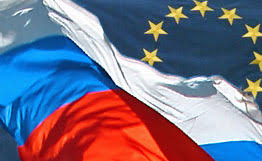Thursday, May 21, 2009
 Russia and EU begin summit amid mutual exasperation
Russia and EU begin summit amid mutual exasperation
 // EU's overtures to eastern Europe and Moscow's gas war among contentious issues for talks at remote venue
// EU's overtures to eastern Europe and Moscow's gas war among contentious issues for talks at remote venue05-21-2009 - Guardian by Luke Harding - Khabarovsk - Russia and the European Union were today holding a summit intended to improve their battered relationship, amid mutual exasperation and irritation in Moscow at the EU's recent attempts to lure eastern European countries away from Moscow's orbit. Russia's president, Dmitry Medvedev, was hosting a two-day EU-Russia summit in the far eastern city of Khabarovsk, close to Vladivostok and Russia's Pacific coast. EU leaders, including the European commission president, José Manuel Barroso, arrived in the city this morning. The summit comes at a time of growing frustration between Brussels and Moscow over a host of issues ranging from energy policy to the war in Georgia. The EU was irritated by Russia's gas war in January with Ukraine and Medvedev's failure to pull Russian troops out of the breakaway Georgian republics of South Ossetia and Abkhazia. For its part, the Kremlin is annoyed by the EU's attempt earlier this month to improve ties with half a dozen post-Soviet countries. A summit of 33 countries in Prague brought the EU's 27 governments together for the first time with the leaders of Ukraine, Georgia, Moldova, Armenia, Azerbaijan and Belarus. Russia believes the EU's "eastern partnership" initiative is a challenge to its own strategic and security interests in a region it regards as its backyard. Medvedev insists that Moscow enjoys what he calls "privileged interests" in states occupying the volatile buffer zone between the EU and the Russian Federation. Today Medvedev joked with a group of students that the remote summit venue, 3,800 miles from Moscow or 5,300 miles via the epic Trans-Siberian Express, had been chosen to remind the Europeans of Russia's vast size. Several EU delegates moaned when Russia held last year's summit with the EU in western Siberia, Medvedev said. "They complained: 'Oh, it's a long way.' We said: 'If you don't like it you can fly somewhere else.' They thought for a bit and said: 'OK, we're ready,'" Medvedev said. He added: "They [the Europeans] should understand how big Russia is and should feel its greatness. On the other hand, we also want a partnership with the EU. It's important for us to get together." Today analysts were pessimistic that this latest EU-Russia summit would make much progress. "Russia and EU relations are in stalemate. There is a serious lack of mutual understanding, a lack of willingness to understand each other, and a lack of strategic common values," Fyodor Lukyanov, editor-in-chief of Russia in Global Affairs, told the Guardian. He went on: "Relations with Obama and the US are now better. At the same time relations with the EU are getting worse. Since the 1990s Russian-EU relations have been governed by the assumption that Russia would go the European way without applying for membership. This model is now exhausted. They need a new model." According to Lukyanov, the Kremlin was furious after the EU pressured Belarus this month not to recognise South Ossetia and Abkhazia. "The message was: choose Russia or not Russia. It was absolutely unnecessary from the European side. Alexander Lukashenko [Belarus's president] wasn't going to recognise them anyway for his own reasons," Lukyanov said. Today Barroso stuck a conciliatory note. "Russia and the EU are interdependent. The global financial and economic crisis stresses the need to develop the potential of our relationship, remove obstacles and co-ordinate our efforts," he declared, saying that "regular and frank dialogue" was the way to overcome "difficult" issues. This afternoon Medvedev took his European colleagues on a scenic boat trip along the vast Amur river. The Amur, which is home to the giant Kaluga sturgeon, passes remote sandy bays and a rustic embankment of willows and oaks, before winding its way to nearby northern China. Negotiations are due to start tomorrow.
Contact me:


